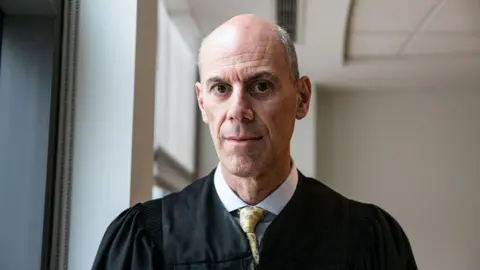Judge says Trump officials could be found in contempt. What happens next?
 Getty Images
Getty ImagesA US federal judge has given President Donald Trump's officials a one-week deadline to comply with his court order or risk being found in contempt of court - potentially setting up a historic clash between two equally powerful branches of government.
Judge James Boasberg said the "most obvious way" for the officials to avoid contempt was to "assert custody" over a group of more than 200 people who they deported to El Salvador last month - after he told them not to do so.
But the Trump administration has shown no sign of a desire to adhere, criticising Wednesday's request and saying it would appeal.
The White House denies any wrongdoing, and has depicted the group as "terrorists and criminal illegal migrants" who threaten American society.
Experts have told the BBC that a showdown between the judicial and executive branch appears all but inevitable. So, what might happen if the government does not comply with Judge Boasberg's deadline of 23 April?
Tracing responsibility
The first step to hold any Trump officials in contempt of court would be to determine who was responsible for the non-compliance, an expert told the BBC.
At the moment, it remains unclear who took the specific actions against Judge's Boasberg's initial order to not deport people to El Salvador, said Robert Tsai, a Boston University constitutional law professor.
Lawyers would use a process called discovery to decide who was responsible, by seeking documents and questioning government officials under oath.
"You want to be able to nail someone down and pinpoint who it is that's basically saying, 'We're getting the planes up in the air, and just stonewall the judge,'" Prof Tsai said.
Government lawyers have said the planes were already en route by the time Judge Boasberg's written order was issued, and that his subsequent verbal order for the planes to return happened when they were no longer in US airspace.
If he felt government lawyers were not playing ball, Judge Boasberg could fine both the lawyers and other government officials until they complied, Prof Tsai said. The sanctions or penalties would apply until the government met the terms of the judge's order.
All of this falls under the umbrella of civil contempt.
Civil or criminal contempt?
There is also the possibility of Trump administration officials being found in criminal contempt - for which the punishment could include jail time.
"That's considered one of the most serious things, and usually the last resort," Prof Tsai said.
In the case of criminal contempt, Prof Tsai said the normal course of events would be to refer the issue for prosecution by the justice department, which is run by Attorney General Pam Bondi.
Judge Boasberg also has the power to appoint a special prosecutor to pursue criminal contempt charges and to sidestep Bondi, a Trump loyalist who was appointed by the president.
"With this administration, it is very possible that the justice department refuses to prosecute," George Mason University law professor Ilya Somin explained to the BBC.
Even if the justice department does take the case, Trump has the power to pardon a criminal offence. But the president does not have the power to issue pardons for civil liability (civil contempt).
Avoiding contempt proceedings
The ruling from US District Judge James E Boasberg on Wednesday said the government showed "wilful disregard" for his order when it sent planes carrying alleged criminals to El Salvador - after he had barred the government from using a wartime law for the deportations.
That law, the 1798 Alien Enemies Act, gave the Trump administration power to expedite its deportation of those it said were gang members without providing any evidence.
The US Supreme Court later ruled that Trump was able to use the wartime law, Judge Boasberg said on Wednesday that "does not excuse the government's violation" of his earlier request.
To avoid contempt proceedings, the judge gave the administration two options - to "purge" itself of contempt, or to remedy its noncompliance.
"The most obvious way", he said, was for the administration to "assert custody" of the hundreds deported to El Salvador's mega-prison, so they could "challenge their removability".
Judge Boasberg said the government would not need to release any of those deported - a number of whom have not been convicted of any crimes - nor fly them back to the US.
The judge said the administration could also "propose other methods of coming into compliance".
The high-stakes collision between a federal judge and the Trump administration comes under a president whose stated goal was to enact the "largest deportation programme" in US history.
If any officials are found in contempt, regardless of Trump's possible involvement, it is unlikely that the president himself would ever be criminally charged, Prof Tsai said, thanks to the Supreme Court's presidential immunity ruling last year.
"I think that the presidential immunity decision that was issued is going to be the thing that protects him from any kind of criminal prosecution," Prof Tsai explained.
"All these orders are sort of policy decisions. They might be illegal, they might be unconstitutional, who knows.
"But even if they are, they're done within the scope of his his core powers," he said.
